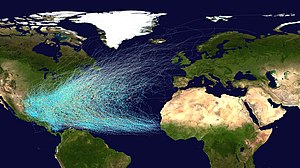
Image via Wikipedia
Medieval Storms Portend Worse Hurricanes
By Phil Berardelli
ScienceNOW Daily News
12 August 2009
For more than a decade, scientists have been trying to determine whether climate change is linked to intense storms, such as 2005's Hurricane Katrina. Meteorologist Michael Mann of Pennsylvania State University, University Park, and colleagues attacked the question by turning to the past. They looked through drill cores from coastal waters for signs that sediments had been disturbed by major storms. Eight sites along the U.S. East Coast and Puerto Rico provided a reliable record of the number of significant hurricanes going back about 1500 years. Other climate data and models added clues to water temperatures and hurricane intensity.
As the researchers report tomorrow in Nature, they found strong evidence that Atlantic hurricane activity peaked about 1000 years ago, producing up to 15 hurricanes a year on average--a level matched in recent times only over the past decade and a half. At the time, according to estimates constructed from other geologic data, Atlantic water temperatures were relatively warm, "though not as warm as today," Mann says. And Pacific temperatures were relatively cool, thanks to La Niña events. Warmer Atlantic waters whip up more storms, but warmer Pacific temperatures tend to create stronger jet streams that break up those storms. So the twin conditions a millennium ago produced kind of a "Perfect Storm" for hurricanes, he explains.
Of particular interest, the sediments reveal a close link between warmer water and the number of hurricanes during the past 150 years or so. Dropping temperatures produced seven or eight hurricanes a year, while a rising thermometer, such as in the earlier part of this decade, pushed the total to 15. "All other things being equal," Mann says, "this suggests that we are indeed likely to see not only stronger hurricanes in the Atlantic but perhaps more of them" in the near future.
Meteorologist James Elsner of Florida State University in Tallahassee agrees with the findings, but adds a caveat. The historical data do show that a link between warmer ocean temperatures and higher hurricane frequencies has existed for at least 1500 years, he says. However, there's a high degree of uncertainty in the data. That and the fact that the physics explaining the link haven't yet been established, Elsner explains, "indicates this is not the 'smoking gun' we've been looking for that would allow us to confidently project what will happen as the oceans continue to warm."
Atmospheric scientist Kerry Emanuel of the Massachusetts Institute of Technology in Cambridge agrees. The paper "shows that hurricane activity is indeed quite sensitive to climate," he says, and that global warming could have a dramatic impact on the severity of these storms in the future.
http://sciencenow.sciencemag.org/cgi/content/full/2009/812/1?rss=1
![Reblog this post [with Zemanta]](http://img.zemanta.com/reblog_e.png?x-id=0eea623d-d998-4918-badf-7e4b3e1d9cdf)